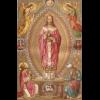File Name: Dreyer, F. C. H. - Roman Catholicism in the Light of Scripture
File Submitter: DoctorDaveT
File Submitted: 08 Sep 2011
File Category: Reference Books (topx)
Author: F.C.H. Dreyere-Sword Version: 9.x - 10.x
Suggest New Tag:: Baptist, Conservative, Catholic
from the Introduction....
Introduction
ROMAN CATHOLICS AND PROTESTANTS have much in common doctrinally. Both groups are monotheists, worshiping the one living God, Creator of Heaven and earth and all that in them is.
Both believe in the Trinity, that in the one Godhead there are three Persons: the Father, the Son, and the Holy Spirit.
Both believe that God is a spirit, and therefore invisible, yet that He has revealed Himself to men, and that this revelation is recorded in the Bible.
Both accept the verdict of the Holy Scriptures concerning human sin, and the alienation from God which sin has brought, and yet that God loves this world of sinners and gave His only begotten Son to be its Saviour.
Both believe that God the Son became incarnate and was of virgin birth, that He was God manifest in the flesh.
Both accept the records of the four Gospels concerning His teaching and miracles, His suffering upon the cross to atone for our sins, His burial, and His resurrection on the third day, and then His ascension to Heaven after forty days.
Both believe in the judgment to come, and of the existence of Heaven and Hell.
Both use the Apostles’ Creed and the Lord’s Prayer in their worship.
The doctrines common to both Protestants and Roman Catholics are many, but the differences which divide them are also many and very great. Broadly speaking; these differences spring from two fundamental roots.
1. The Roman Catholic Church says that the Bible, by itself, does not cover the whole field of revelation, and that it has been supplemented by the teachings and decisions of the “Holy Mother Church” and the Pope as the “Vicar of Christ.”
Against this, Protestants maintain that for all matters of faith and practice, the revelation contained in the Bible is sufficient and of final authority.
2. The second fundamental difference concerns the way of salvation. Romanism holds that Peter was the rock upon which the church was founded. The merits of Christ’s death on the cross were entrusted to the church, which, by means of the sacraments, bestows them on those seeking salvation. Moreover, only those ordained as bishops or priests can administer the sacraments; thus bishops and priests stand as indispensable mediators between God and the sinner. The sequence is: Christ, the church, the sacraments, the priest, and the sinner. The sinner comes to the priest, who administers the sacraments by which the sinner enters the church, and therein becomes a partaker of the merits of the cross, by which he is saved.
The Protestant position is that “there is one mediator between God and men, the man Christ Jesus” (1Ti_2:5). The sinner, moved by the Holy Spirit through the preaching of the Gospel, and depending upon the promises of God in the Holy Scriptures, comes directly to Christ, to receive from Him, immediately and fully, forgiveness of sins, and the witness of the Holy Spirit in his heart that he is a child of God and an inheritor of the kingdom of Heaven.
Which is the true way of salvation? Is it from Christ direct to the sinner, or is it through priests and sacraments and church? The answer is of vital importance, for the eternal destiny of souls is at stake.
This book attempts to examine the wide field of questions in dispute. It is not written in any spirit of disputation for disputation’s sake, or just to prove someone else is wrong, but that the truth as revealed in the Holy Scriptures, the Word of God, may be clearly seen.
“Ye shall know the truth, and the truth shall make you free” (Joh_8:32).
Jesus, the sinner’s Friend!
We hide ourselves in Thee;
God looks upon Thy sprinkled blood,
It is our only plea.
He hears Thy precious name,
We claim it for our own:
The Father must accept and bless
His well-beloved Son.
He sees Thy spotless robe
It covers all our sin;
The golden gates have welcomed Thee,
And may we enter in.
Thou hast fulfilled the law,
And we are justified;
Ours is the blessing, Thine the curse;
We live, for Thou hast died.
Jesus, the sinner’s Friend!
We cannot speak Thy praise:
No mortal voice can sing the song
That ransomed hearts would raise.
But when before the throne,
Upon the glassy sea,
Clothed in our blood-bought robes of white
We stand complete in Thee:
Jesus, we’ll give Thee then
Such praises as are meet,
And cast ten thousand golden crowns,
Adoring, at Thy feet.
- Mrs. Pennefather
Click here to download this file

















